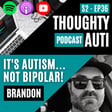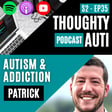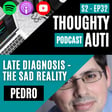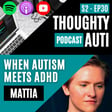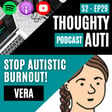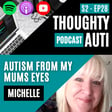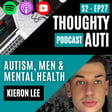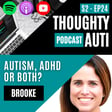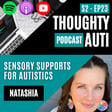
Autistic People Have Lost Hope In Life
Why do 6 in 10 Autistic people contemplate taking their life? Why is mental illness so prevalent in Autistic people? What are Thomas' and Hina's experience with mental illness?
TW: Mental health, bullying, ED, SH, and SUI
Hina is a UK-based community support officer who is currently working on a creative SUI prevention project, coproduced with Autistic adults and seeking to shed light on the experiences of Autistic people. Within the episode, she shares her experiences with contamination OCD, mental illness, ED, and SUI.
My Links - https://linktr.ee/thomashenleyUK // SUI Prevention Hotlines - https://www.medicalnewstoday.com/articles/327007
Dbud Noise Cancelling Adjustable Ear Buds (20% Off with code: THOUGHTYAUTI) - https://dbud.io/thoughtyautipodcast
Thomas Henley (host) kicks off the episode with a heavy disclaimer and an overview of a Nottingham University Study (2017) showing that:
8 in 10 - Almost 8 in 10 autistic adults have a mental health condition
6 in 10 - More than 6 in 10 autistic people have considered SUI
3 in 10 - More than 3 in 10 autistic adults have attempted SUI
Thomas highlights that statistics like these are easily accessible, but the mainstream media are not disseminating this crucial information on the life quality of Autistic people. He theorises that this may be due to the assumption that Autism inherently carries a lower quality of life with it, which may be a barrier to understanding the disability as a consequence of uninclusive systems or negative life experiences.
In the conversation about higher rates of mental illness among Autistic individuals, Hina starts by underscoring the contribution of misdiagnosis, lack of diagnosis, and autistic masking as key contributors to mental illness. Thomas explains how the negative life experiences around such things as bullying and isolation can impact the development of depression through the HPA axis.
Thomas and Hina share their own personal experiences with mental health, isolation, ED, SH, and SUI in an effort to destigmatise speaking out about the tipping points of mental illness. Going from adolescence to adulthood, they spotlight their lowest points in their mental health journey, drawing attention to the impact of an insufficient mental health system on Autistic people's outcomes.
Speaking on the positive effects of support, they highlight the problems and benefits of anti-depressant medication on their mental health, the importance of family and friends in building a strong support network, and how autism education helped them conceptualise and deal with their mental illness much more effectively.
Lastly, they touch on the stigma around SUI being selfish, mental illness being a personality trait, and the stigma of mental illness in men. Thomas speaks on the 'Andrew Tate mentality' that a lot of men have around mental health, and how strength is shown more through acknowledging your feelings rather than hiding them and pretending they don't exist.
Song Of The Day (Listen Here)







